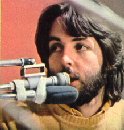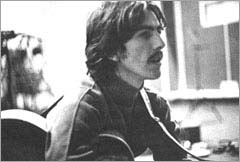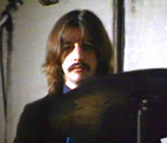Let It Be Originally released in the UK, May 8, 1970
*Plus SINGLES:
Don't Let Me Down [B-side of Get Back] UK release: 4/11/69
You Know My Name (Look Up The Number) [B-side of Let It Be] UK release: 3/6/70
TWO OF US(Lennon/McCartney)
PAUL AND GEORGE 1969:
(arguing during the recording of the song 'Two Of Us')
PAUL: "It's complicated now. We can get it simpler, and then complicate it where it needs complications."
GEORGE: "It's not complicated."
PAUL: "This one is like, shall we play guitars through 'Hey Jude' ...well, I don't think we should."
GEORGE: "Ok well I don't mind... I'll play, you know, whatever you want me to play, or I wont play at all if you don't want to me to play. Whatever it is that will please you... I'll do it!"
JOHN: "I wish that we could start hearing the tapes now. Like-- Do it, and then hear what it is. Is it just 'cuz we don't feel like it, or is it 'Does the guitar sound alright, really.'"
JOHN 1969: (ad-libbing during the recording sessions) "'Two of us wearing postcards.'"
DIG A PONY(Lennon/McCartney)
JOHN 1972: "I was just having fun with words. It was literally a nonsense song. You just take words and you stick them together, and you see if they have any meaning. Some of them do and some of them don't."
JOHN 1980: "Another piece of garbage."
ACROSS THE UNIVERSE(Lennon/McCartney) JOHN 1972: "One of my best songs. Not one of the best recordings, but I like the lyrics."
JOHN 1972: "One of my best songs. Not one of the best recordings, but I like the lyrics."
JOHN 1980: "I was a bit more artsy-fartsy there. I was lying next to my first wife in bed, (song originally written in 1967) you know, and I was irritated. She must have been going on and on about something and she'd gone to sleep-- and I kept hearing these words over and over, flowing like an endless stream. I went downstairs and it turned into a sort of cosmic song rather than an irritated song-- rather than 'Why are you always mouthing off at me?' or whatever, right? ...and I've sat down and looked at it and said, 'Can I write another one with this meter?' It's so interesting. 'Words are flowing out like endless rain into a paper cup/ They slither while the pass, they slip away across the universe.' Such an extraordinary meter and I can never repeat it! It's not a matter of craftsmanship-- it wrote itself. It drove me out of bed. I didn't want to write it... and I couldn't get to sleep until I put it on paper... It's like being possessed-- like a psychic or a medium. The thing has to go down. It won't let you sleep, so you have to get up, make it into something, and then you're allowed to sleep. That's always in the middle of the night when you're half-awake or tired and your critical facilities are switched off."
I ME MINE(Harrison)
GEORGE 1980: "'I Me Mine' is the ego problem. I looked around and everything I could see was relative to my ego. You know, like 'that's my piece of paper,' and 'that's my flannel,' or 'give it to me,' or 'I am.' It drove me crackers-- I hated everything about my ego-- it was a flash of everything false and impermanent which I disliked. But later I learned from it-- to realize that there is somebody else in here apart from old blabbermouth. 'Who am I' became the order of the day. Anyway, that's what came out of it: 'I Me Mine' ...it's about the ego, the eternal problem."
 LET IT BE(Lennon/McCartney)
LET IT BE(Lennon/McCartney)
JOHN 1980: "That's Paul... I think it was inspired by 'Bridge Over Troubled Water.' That's my feeling, although I have nothing to go on. I know he wanted to write a 'Bridge Over Troubled Water.'"
PAUL 1986: "I had alot of bad times in the '60s. We used to lie in bed and wonder what was going on and feel quite paranoid. Probably all the drugs. I had a dream one night about my mother. She died when I was fourteen so I hadn't really heard from her in quite a while, and it was very good. It gave me some strength."
PAUL circa-1994: "One night during this tense time I had a dream I saw my mum, who'd been dead ten years or so. And it was great to see her because that's a wonderful thing about dreams, you actually are reunited with that person for a second... In the dream she said, 'It'll be alright.' I'm not sure if she used the words 'Let it be' but that was the gist of her advice, it was 'Don't worry too much, it will turn out okay.' It was such a sweet dream I woke up thinking, 'Oh, it was really great to visit with her again.' I felt very blessed to have that dream."
I'VE GOT A FEELING(Lennon/McCartney)
PAUL 1969: (describing a guitar lick for the middle-eight, during the recording sessions) "It's coming down too fast-- the note. There shouldn't be any recognizable jumps. Falling... Falling..."
ONE AFTER 909(Lennon/McCartney)
PAUL 1969: (during the album recording sessions) "...one of the first songs we’d ever done. We all used to sag off every school day, you know, and go back to my house. And the two of us would just sit there and write, 'Love Me Do' and 'Too Bad About Sorrows.' And there’s a lot from then, about 100 songs from then that we never reckoned. ‘Cuz they were all very unsophisticated songs, but they're great, you know. We always hated the words of 'One After 909.'"
JOHN 1980: "That was something I wrote when I was about seventeen. I lived at 9 Newcastle Road. I was born on the ninth of October-- the ninth month. It's just a number that follows me around, but numerologically, apparently I'm a number six or a three or something, but it's all part of nine."
PAUL circa-1994: "It was one that we always liked doing, and we rediscovered it. There were a couple of tunes that we wondered why we never put out-- either George Martin didn't like them enough to, or he favored others. It's not a great song but it's a great favorite of mine because it has great memories for me of John and I trying to write a bluesy freight-train song. There were alot of those songs at the time, like 'Midnight Special,' 'Freight Train,' 'Rock Island Line,' so this was the 'One After 909.' She didn't get the 909, she got the one after it!"
THE LONG AND WINDING ROAD(Lennon/McCartney)
PAUL 1970: "The album was finished a year ago, but a few months ago American record producer Phil Spector was called in by John Lennon to tidy up some of the tracks. But a few weeks ago, I was sent a re-mixed version of my song 'The Long And Winding Road' with harps, horns, an orchestra, and a women's choir added. No one had asked me what I thought. I couldn't believe it. The record came with a note from Allen Klein saying he thought the changes were necessary. I don't blame Phil Spector for doing it, but it just goes to show that it's no good me sitting here thinking I'm in control because obviously I'm not. Anyway, I've sent Klein a letter asking for some things to be altered, but I haven't received an answer yet."
JOHN 1980: "Paul again. He had a little spurt just before we split."
PAUL circa-1994: "It's rather a sad song. I like writing sad songs, it's a good bag to get into because you can actually acknowledge some deeper feelings of your own and put them in it. It's a good vehicle, it saves having to go to a psychiatrist. Songwriting often performs that feat-- you say it, but you don't embarrass yourself because it's only a song, or is it? You are putting the things that are bothering you on the table and you are reviewing them, but because it's a song, you don't have to argue with anyone... It's a sad song because it's all about the unattainable; the door you never quite reach. This is the road that you never get to the end of."
 FOR YOU BLUE(Harrison)
FOR YOU BLUE(Harrison)
GEORGE 1980: "'For You Blue' is a simple twelve-bar song following all the normal twelve-bar principles, except that it's happy-go-lucky!"
GET BACK(Lennon/McCartney)
JOHN 1969: "We'd been talking about it since we recorded it, and we kept saying 'That's a single.' Eventually we got so fed up talking about it we suddenly said 'Okay, that's it. Get it out tomorrow.'"
PAUL 1969: "We were sitting in the studio and we made it up out of thin air. We started to write words there and then... When we finished it, we recorded it at Apple Studios and made it into a song to rollercoast by."
JOHN 1969: "The way we're writing at the moment, it's straightforward and there's nothing weird. Songs like 'Get Back,' things like that. We recorded that one on the Apple roof but I'm not sure if that's the (single) that went out. We always record about ten versions. You get lost in the end."
RINGO 1969: "Paul takes the lead vocal, and you can say it's a lovely little toetapper. If you can sit down when this one is on, then you're a stronger man than I am."
JOHN 1980: "'Get Back' is Paul. That's a better version of 'Lady Madonna.' You know, a potboiler rewrite."
 DON'T LET ME DOWN(Lennon/McCartney)
DON'T LET ME DOWN(Lennon/McCartney)
JOHN 1969: (to Ringo, regarding the cymbal smash in the intro) "Give me a big 'kzzzsshhhh!' Give me the courage to come screaming in."
JOHN 1980: "That's me, singing about Yoko."
PAUL circa-1994: "It was a very tense period. John was with Yoko, and had escalated to heroin and all the accompanying paranoias and he was putting himself out on a limb. I think that, as much as it excited and amused him, at the same time it secretly terrified him. So 'Don't Let Me Down' was a genuine plea, 'Don't let me down, please, whatever you do. I'm out on this limb...' It was saying to Yoko, 'I'm really stepping out of line on this one. I'm really letting my vulnerability be seen, so you must not let me down.' I think it was a genuine cry for help. It was a good song. We recorded it in the basement of Apple for 'Let It Be' and later did it up on the roof for the film. We went through it quite alot for this one. I sang harmony on it, which makes me wonder if I helped with a couple of the words, but I don't think so. It was John's song."
YOU KNOW MY NAME (LOOK UP THE NUMBER)(Lennon/McCartney)

JOHN 1969: "There was another song I wrote around 'Pepper' time that's still in the can, called 'You Know My Name Look Up The Number.' That's the only words to it. It just goes on all the way like that, and we did these mad backings. But I never finished it, and I must."
JOHN 1980: "That was a piece of unfinished music that I turned into a comedy record with Paul. I was waiting for him in his house, and I saw the phone book was on the piano with the words, 'You know the name, look up the number.' It was like a logo, and I just changed it. It was going to be a four tops kind of song-- the chord changes are like that-- but it never developed and we made a joke out of it."
PAUL 1988: "People are only just discovering the B-sides of Beatles singles. They're only just discovering things like 'You Know My Name' --probably my favorite Beatles track! Just because it's so insane. All the memories-- I mean, what would you do if a guy like John Lennon turned up at the studio and said, 'I've got a new song.' I said, 'What's the words?' and he replied, 'You know my name look up the number.' I asked, 'What's the rest of it?' '...No. No other words, those are the words. And I wanna do it like a mantra!' We did it over a period of maybe two or three years. We started off and we just did 20 minutes, and we tried it again and it didn't work. We tried it again, and we had these endless, crazy fun sessions. Eventually we pulled it all together and I sang, (sings in jazzy voice) 'You know my name...' and we just did a skit. Mal (Evans) and his gravel. I can still see Mal digging the gravel. And it was just so hilarious to put that record together. It's not a great melody or anything, it's just unique. Some people haven't discovered that song yet."
PAUL circa-1994: "I remember at one point we asked Mal (Evans) to shovel a bucket of gravel as a rhythmic device. We had a bit of a giggle doing those kind of tracks... Brian Jones (Rolling Stones) plays a funny sax solo. It's not amazingly well played but it happened to be exactly what we wanted. Brian was very good like that."
REGARDING THE ALBUM, BEFORE ITS OFFICIAL RELEASE
JOHN 1969: "It'll be a single LP, but this one's got a book with it-- a whole book of making the LP. And we've also made a film of it at the same time, so we've got to get that together. All the traumas and paranoia-- all the different things that happen to you when you try and make a record."
ON THE BEATLES 'FINAL' ALBUM
RINGO 1994: "In 1970 'Let It Be' came out as the last album, though 'Abbey Road' was, of course, the last to be recorded. It goes to show how quirky the world is-- the next to the last album comes out as the last album, and the last album comes out before it. But we split up after 'Abbey Road,' and weren't really thinking about splitting on the one before. It's all very strange."
ON PRODUCTION AND MIXING OF THE ALBUM
JOHN 1969: "A lot of the tracks will be like 'Get Back,' and a lot that we did in one take, kind of thing. We've done about 12 tracks, some of them still to be remixed."
JOHN 1969: "I'm not really interested in the production of our records. In fact, I wish I didn't have to go through that whole thing, going through the production and balancing the bass and all that. For me, the satisfaction of writing a song is in the performing of it. The production bit is a bore. If some guy would invent a robot to do it, then it would be great. But all that 'get the bass right, get the drums right,' that's a drag to me. All I want to do is get my guitar out and sing songs."
PAUL 1996: "It was all done over my head. I had an acetate of the final mixes that Glyn Johns had done, and I remember taking it home... and listening to it with him. Today it would sound 'Unplugged' because it was very basic, very bare. And I thought, 'This is good... really good. We're reduced to just bare bones. There's something great about it. Something very compelling.' But Allen Klein stuck his oar in, and he said, 'Look I don't think it's right,' and he made alot of decisions. I think it was his decision to bring Phil Spector in. We were all sort of feeling that we had come to the end... The little bunny rabbits' batteries were running down. We were all fraught with each other and just about everything else. We were probably all on the verge of nervous breakdowns."
REFERENCES:
- Beatles At The Movies- Roy Carr, 1996
- Beatles Book Monthly
- Beatles Recording Sessions- Mark Lewisohn, 1988
- Beatlesongs- William J. Dowlding, 1989
- Billboard Magazine/Harrison, 1999
- David Frost Interview/McCartney
- Final Testament: 'Unedited' Lennon/Playboy Interviews
- Let It Be- movie/sessions dialog
- Many Years From Now- Barry Miles, 1997
- Playboy Magazine/McCartney
- Press conferences and archived audio interviews
- Rolling Stone Magazine/Lennon
- The Beatles- Hunter Davies
- The Beatles In Their Own Words- Barry Miles 1978
|

